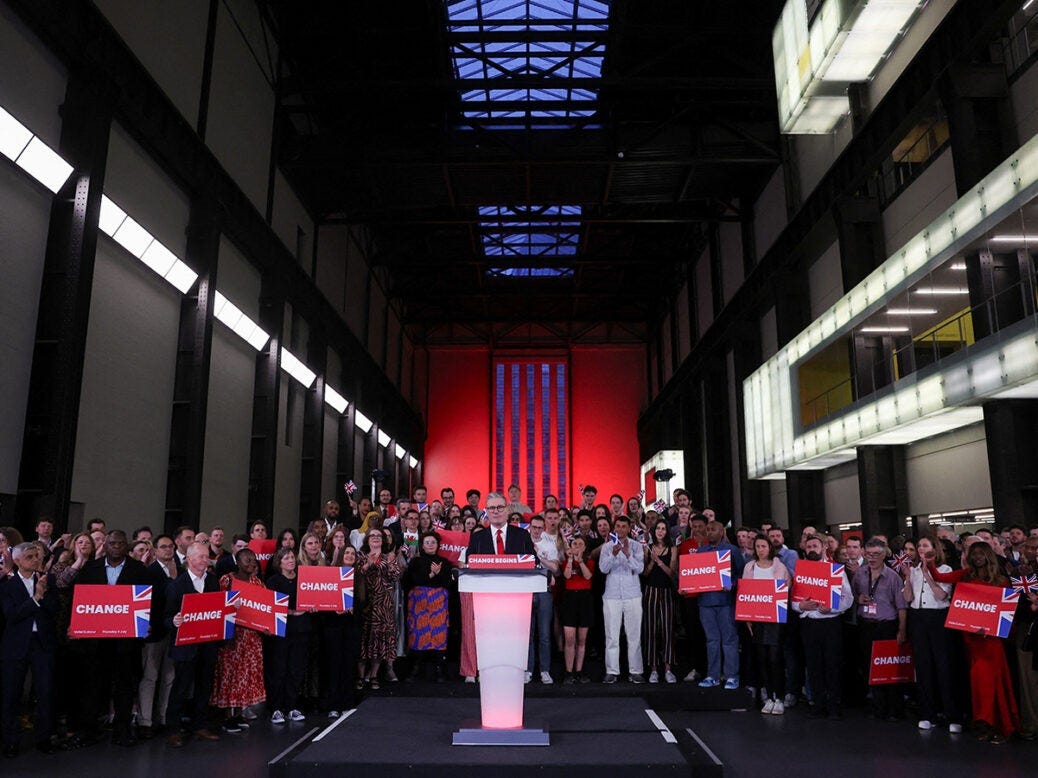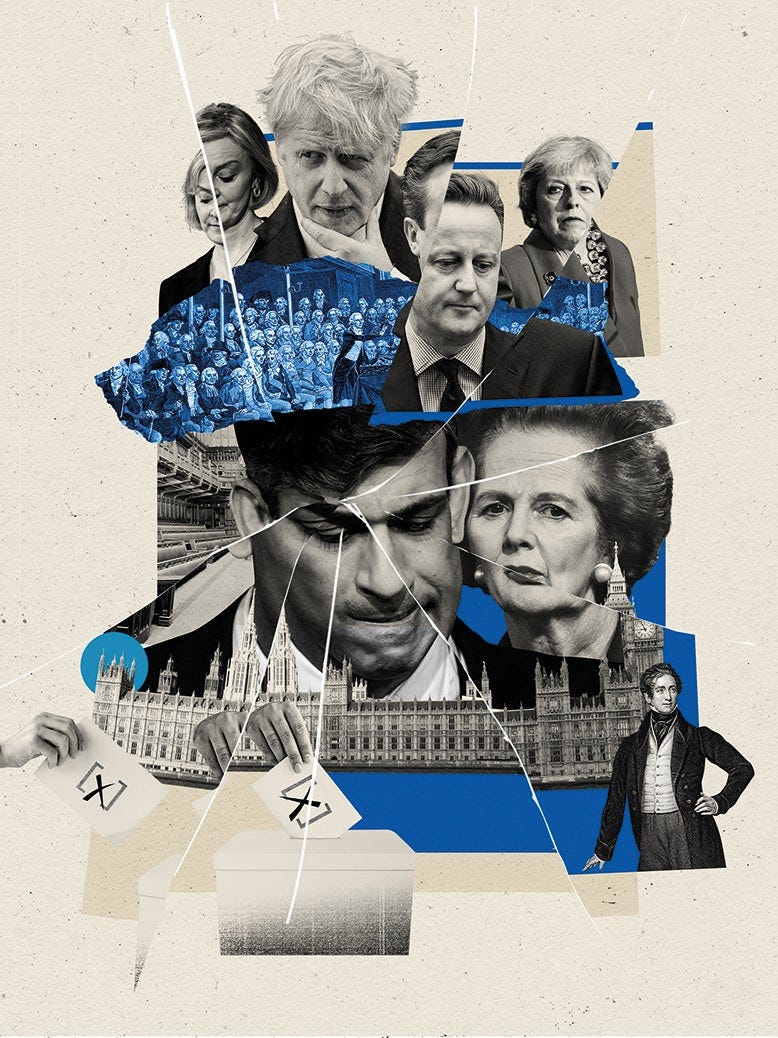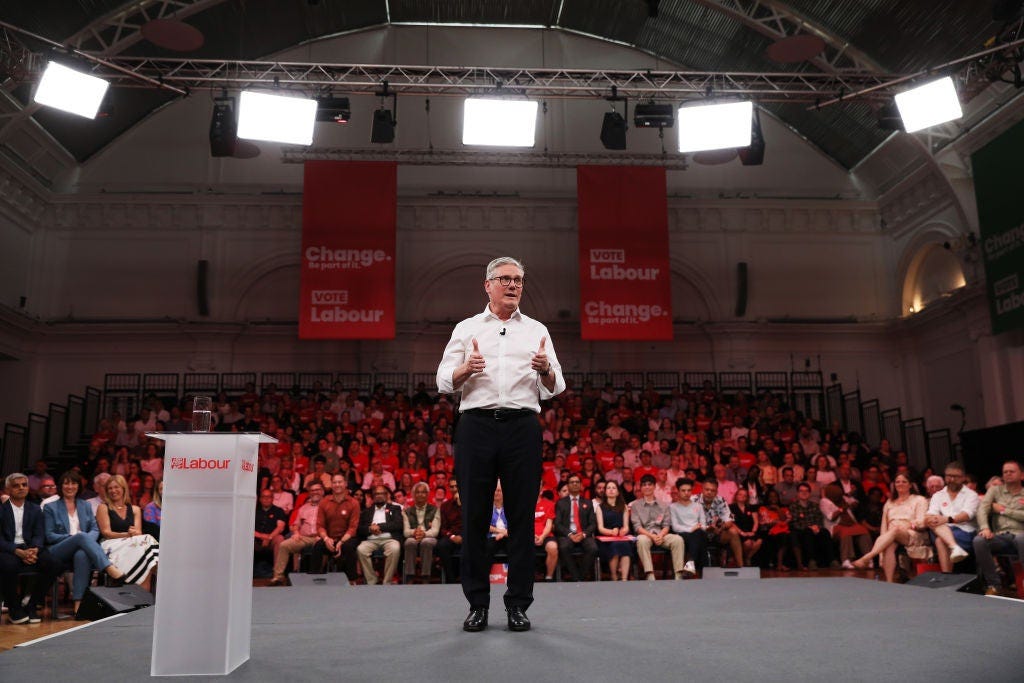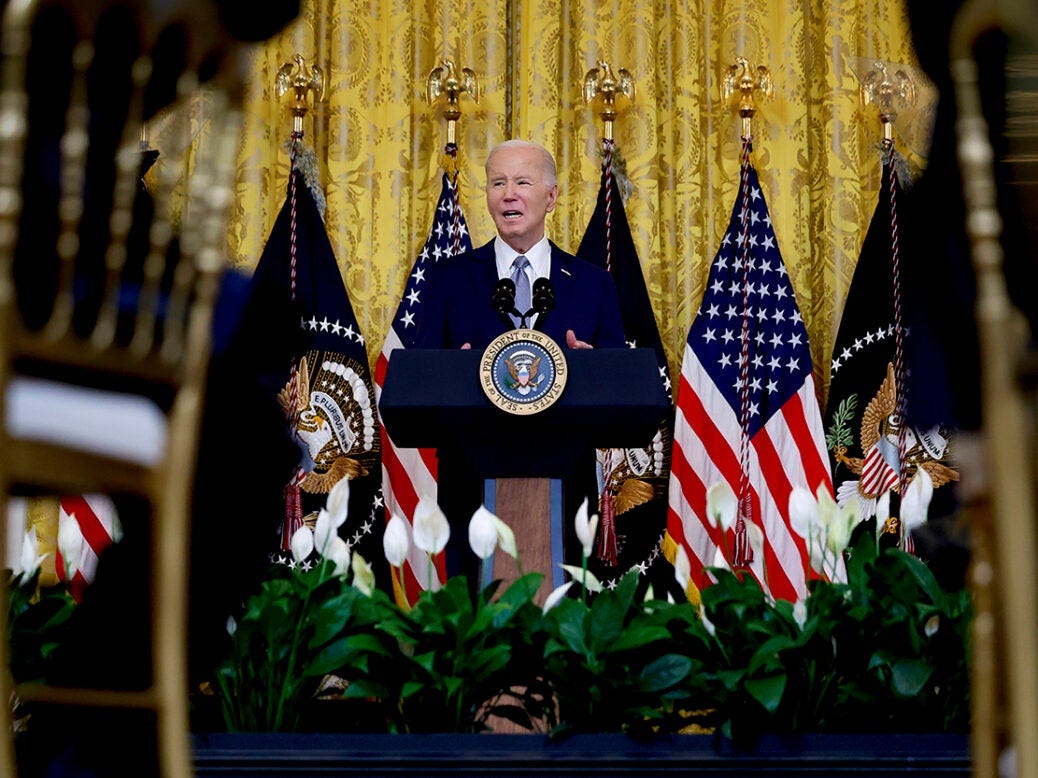The Saturday Read: Starmer victorious
Inside: Labour’s triumph, Biden’s choice and St Jude Bellingham.
Good morning. Welcome to the Saturday Read, the New Statesman’s guide to politics, culture, books, and ideas. This is Jason, together with Finn, Nicholas, Pippa and George.
I’ve spent the last sleep-deprived 24 hours or so trying to process the remarkable general election results in Britain and the scale of Keir Starmer’s achievement. In one parliamentary term the cautious, bespectacled lawyer has led Labour from its worst general election defeat since 1935 to one of its greatest victories. The Conservatives were deservedly routed after so many years of misrule and dysfunction. The process of Brexit has broken the Conservative Party. Liz Truss, prime minister for a miserable 49 days before she was removed from office by her own MPs, experienced the indignity of losing her seat in South West Norfolk, squandering a majority of 26,000. In Scotland, the Scottish National Party, for so long hegemonic, was also routed as voters punished the nationalists for their incompetence, corruption scandals and arrogance. The secessionist SNP seems to be on a road to nowhere.
But let’s not be fooled. These are not progressive new times. The liberal order is in retreat. The world is being remade around geopolitical risk and threats of war. The mood in the country is restive and Labour’s support is broad but shallow. Nigel Farage’s insurgent right-wing nationalist Reform party, the self-styled people’s army, came second in 98 seats winning 14 per cent of the vote (compared to 34 per cent for Labour). Under a proportional voting system Reform would have had perhaps as many as 90 MPs (rather than just the five it won under the first past-the-post system). Farage announced, in his victory speech in Clacton, that he was coming for Labour voters. And he will if Starmer and Rachel Reeves cannot deliver on their promised plans for growth, or fail to bring a greater sense of social cohesion to the regions and nations of these islands. All that lies in the future. For now, we should unreservedly welcome this new Labour era. And don’t forget the football later today.
The picks…
Good morning, Finn here. Here are our picks of the best stuff from across the New Statesman this week (some week!). In the first half we’ve focused on our favourite election pieces. Then we look to America, China and, of course, the football. Pippa signs us off with a dispatch from our election-night party. As ever, have a great weekend and thanks for reading.
1—“July 2024 will be remembered for a century.”
It’s so much to take in! Is this history? What to make of it all?! Enter Andrew Marr. The facts are these: voters have given Keir Starmer the space for a dramatic national rebuild, but only conditionally. The Tories are not finished, and Reform, the Greens, the Lib Dems and Gaza-focused independents are all ascendant. Starmer must act quickly and well: impatient Britain watches. GM
As the night wore on, it became clearer this was not just a simple Tories-out, Labour-in story. The more we look in detail, the more this seems like the night of the great insurgency – a multi-sided protest and revolt against politics as usual. The British public was sending the political class, Labour included, a message which could be summed up as: we, not you, are the masters now, and for a very long time to come.
2—“The Conservative Party seems unable to escape Thatcher’s shadow.”
The most successful electoral machine in world history has exploded; its remaining MPs are the shrapnel, the rubble and the stench of cordite left behind. But the Conservative Party has displayed miraculous powers of reconstruction and regeneration in the past, and has remained Britain’s “natural party of government” for over a century. The historian Colin Kidd weighs up whether another metamorphosis is possible now, with so many of the party’s ideologues still in thrall to the stale orthodoxies of the 1980s. NH
While many Conservatives – including Liz Truss and Rishi Sunak – continue to regard Thatcherism as a policy for all seasons, others have long sought an alternative vision, one that would equip the party to reduce the inequalities in British society that are an inescapable part of Thatcher’s legacy. After the anticipated electoral rout there will be a post-mortem, but will it be a continuation of a longer discussion about the party’s future stretching back to the early years of this century?
3—“I had never known electoral victory. Until last night.”
The 14 years I have been eligible to vote map exactly on to the 14 years the Tories have been in power. In the early hours of the new Labour government, I reflected on what this win means for my generation – one that entered adulthood in a time of austerity, tuition-fee betrayal, stagnating wages, job insecurity and a housing market determined to squeeze us out. PB
Looking back, part of my anguish over the 2019 election result was a feeling of keen alienation from the rest of the country. My cohort, those who went to the polls for the first time in 2010, had a profound and furious conviction that the status quo did not work for us, and were more than twice as likely to vote for Jeremy Corbyn’s Labour Party than for Johnson’s Tories as a result. La la la la la, the rest of the country seemed to respond: what are you complaining about, you silly little children? Aren’t you mature enough to realise that Corbyn is an unelectable crank?
4—“Does it represent change? Even before it has passed a single bill, the answer is yes.”
Woah, steady on the apathy! cries George Eaton this week. If you peer between the various reasons to feel a Starmerish caution towards Starmer, which surely exist, you might just see reasons to believe in “change”. The manifesto is a work of “quiet radicalism”. This government could well be transformative. GM
But change will come – and in some areas swiftly. A Labour government will overhaul antiquated planning laws, tax private schools, introduce the biggest programme of workers’ rights for decades, establish the publicly owned GB Energy, renationalise the railways, ban new North Sea oil and gas licences, reduce the voting age to 16 and seek to sign a UK-EU defence and security pact. The manifesto was a work of quiet radicalism, concealed by a cautious campaign.
To enjoy our latest election news and analysis with unlimited access to our coverage click here to subscribe to the New Statesman. You’ll enjoy all of the New Statesman online content, ad-free podcasts and invitations to NS events.
Who is the real Keir Starmer?
The next few months will be dominated by some serious thinking about the future of Labour’s soul: what does Starmerism really mean? How will David Lammy’s progressive realism face the challenges of a divided Europe and perhaps a Donald Trump presidency? How does this all intersect with Rachel Reeves’ securonomics? Important questions, to which you will find the best answers in the pages of the New Statesman, of course.
But at the Saturday Read we also want to know Starmer on a human level. Nicholas, our political correspondent Freddie Hayward, and I have made our pitches for the best way to understand the man behind horn-rimmed specs.
Freddie: There are two versions of Starmer on the bookshelf. According to Oliver Eagleton’s The Starmer Project, he is a ruthless establishment loyalist who spent his time as director of public prosecutions kowtowing to the Americans. Eagleton depicts a man with authoritarian instincts who dispenses punishment with relish. The case for the defence has been written by the erstwhile party adviser Tom Baldwin, who paints an unfailingly sympathetic portrait in Keir Starmer: The Biography. For Baldwin, Starmer is a decent, ordinary man motivated by duty and service. The truth probably lies between the two.
Finn: I think you can tell a lot about someone based on the places they haunt. Keir Starmer’s north London neighbourhood, Kentish Town, is home to the beloved pub the Pineapple. His drink of choice is an IPA, so the staff say. In this pokey, labyrinthian pub you will find cheap pints; astringent white wine; reams and reams of beige food; and potentially, the Prime Minister. If someone’s local is a true reflection of their soul, then we are in reliable if uninspiring hands.
Nicholas: Starmer – himself a talented flautist – is said to have been a great fan of the Smiths in his younger years. I wonder which of their lyrics were cycling through his head as he gave his victory speech: “England is mine” or “Panic on the streets of London”? But there is something drizzly and repressed in their music that seems to suit him well. One Starmerologist, Patrick Maguire, insists that music is his “private passion”. Peer into the maudlin, suggestive world of Morrissey’s lyrics if you dare, and discern what you can.
5—“Patronising, out of touch, cynical and, above all, in denial.”
Fighting words from Ed Smith this week on Joe Biden, the coterie of loyalists surrounding him, and the inadequacies of the Democrat machinery. For those of us who watched Biden’s sorry performance against Donald Trump (who also put in a sorry performance) in the presidential debate last week, it must be hard to disagree with the conclusion that Biden isn’t up to task. But the question that will dominate for weeks ahead: will getting rid of him at this stage reverse the party’s fortunes? Or have the Democrats left it far too late? You’ll hear a lot from us as we try to get to the bottom of this serious conundrum. FMcR
Who will end this tragic chapter in public life? The candidates who could perform this duty fall into three categories: the doctor, the spouse and the party elders. Assuming she is not deliberately inflicting on her husband a humiliation beyond even the cruel imagination of Evelyn Waugh, we can only conclude that Jill Biden’s judgement has been impaired by attachment to the trappings of high office. If an honourable doctor can’t be found, then it could be left to Barack Obama to intervene. (Not that it looks likely based on his post-debate tweet supporting Biden.) Democrats putting loyalty to Biden ahead of the country and the world are being selfish – and unkind. Every day that Biden’s career continues is an act of cruelty towards the president.
6—“America can’t afford Chinese hegemony in Asia.”
As American politics threatens to fall into a black hole of chaos and embarrassment, it’s interesting to hear from the “best and brightest”, the intellectuals who staff so much of the US government whichever party is in power. This week, Sohrab Ahmari spoke to Elbridge Colby, a senior Pentagon strategist in the last Trump administration who is widely tipped for a top role should there be another. His ideas on grand strategy in Europe and Asia are increasingly influential in Washington. NH
Stripped to its core, Colby’s logic comes down to this: “Asia’s more important than Europe, China is more formidable than Russia, and the other European states are much stronger relative to Russia than the Asian ones are relative to China. Today, it’s clear as a bell that we should be focusing on Asia”... Is Elbridge Colby fated to emerge as a Trumpian analogue to Jake Sullivan, President Biden’s national security adviser?
7—“It can happen that the personal drama of an artist reflects the crisis of an entire civilisation.”
What “unlocks the valves of sensation”? Confrontation – and it is that – with Francis Bacon’s paintings leave you in no doubt that he knew, but doesn’t reveal what he knew. John Banville has articulated, beautifully, the painter’s savage and pitiless vision. GM
There are other ways of seeing Bacon’s pictures. One way is to regard them as straightforward though powerfully distorted depictions of, and celebrations of, male homosexual congress, in its more masochistic extremes of lavish suffering, pleasure and fulfilment. Bacon was a masochist, and by his own account, frequently repeated, he enjoyed being beaten by his lovers and casual male pick-ups. Even his portraits of women seem to catch his subjects in the instant after they have been delivered a sweeping, disfiguring blow to the torso or the face.
8—“A stroppy, superior, bumptious little brat.”
Jude Bellingham gave a large number of Englishfolk some of the best few minutes of their lives last Sunday. We’re sometimes pleased, or even cheered by an England match but that euphoria really was heart-stopping. Ahead of tonight’s quarter-final, Clive Martin has produced the most searching study of this fascinating player yet. In short: Bellingham is not your ne’er do well tabloid player or a darling of bien pensant England, but something else altogether. NH
There is a quiet sense of disappointment that Bellingham is not the boy scout that right-minded Britain wanted. This reveals a strange desire for absolute deference from our sports stars, a prefect fetish, a Matthew Pinsent ideal… Somehow, he is saddling both TalkSport scorn and liberal Britain’s delusions. Both camps seem to hold the same belief that these young athletes need to represent something greater than themselves, then discard them when they fail to reach those standards.
George’s Best of the Rest
FT: Labour wins!
Guardian: UK stocks rise and pound edges up as investors digest Labour win.
Independent: Rent in Britain hits record high.
Barron’s: Putin and Xi headline anti-West summit.
William Davies: The last 14 years.
Helen Lewis: Goodbye Tory Britain.
Sam Kriss: The abject misery of the UK.
Kenber and Kennedy: How a young Keir Starmer made his name as a radical barrister.
Freya India: Love is worth believing in. “I guess I just think if you’re going to fall for anything in modern life it should be another person.”
Blyth returning officer’s feathered hat becomes election’s breakout star.
Why whole genome sequencing can improve child cancer treatments.
Caesar salad’s 100th birthday! Hail salad!
Rewilding plan aims to bring majestic white storks to London. Talk about pro-natalist policy.
And with that…
On Thursday night 400-odd of the New Statesman’s brightest thinkers and writers – Jesse Armstrong, Howard Jacobson, David Olusoga, Helen Thompson, Ian Hislop – and a few hangers-on (ie, me, Finn, Nick and George) descended on the National Liberal Club, a short walk from Downing Street, to see in the new era. How many of them made it into the photobooth in the early hours remains to be seen. Our esteemed colleagues Jason Cowley, Hannah Barnes and Andrew Marr, as well as the Mayor of London, Sadiq Khan, and David Lammy, who is now the Foreign Secretary, all marked the night with speeches. Also in attendance were many of our age’s most consequential figures: Donald Trump, Joe Biden, Nigel Farage – in cardboard cut-out form. I am told one of them made its way to the UnHerd offices at the end of the night, carted off like the election-night equivalent of nicking a traffic cone.
Aside from a brief panic around 9.30pm that the wine had run out, the main event of the evening was the exit poll, which predicted Labour would enter Downing Street on a landslide, with 410 seats to the Tories’ 131. The moment was counted down to with great jubilation, as if at a New Year’s party (which, in a way, I suppose it was), and greeted by cheers and hugs – though I only spotted a solitary tear.
It was a marked contrast to the 2019 election party, at which the exit poll was met by a single, scowled-at whoop, after which the queue for the cloakroom snaked through the venue for half an hour as everyone tried to leave at the same time. This year my great disappointment of the evening was not getting to meet my back-pages column counterpart Nicholas Lezard – though the wine shortage suggests he was in attendance.
— Pippa
The New Statesman is home to the finest writing on politics, culture and ideas. To stay up to date, subscribe using the link above.






















Can you explain how you can do a wrap of the General Election and avoid even MENTIONING the Liberal Democrats, let alone mentioning their most successful election in 100 years?
And I’ll never forget the 2019 general election - when the New Statesman refused to call for a vote for Labour.